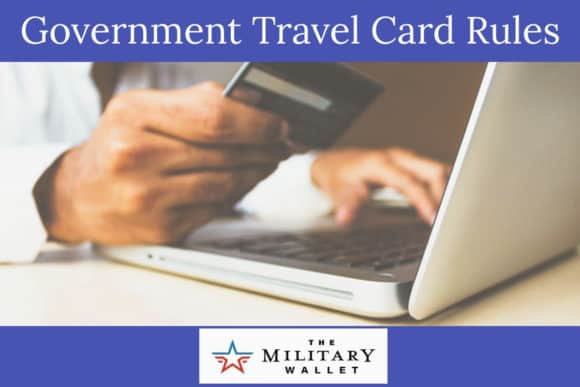Table of Contents
You just received your first GTCC — the federal government’s version of a corporate travel credit card. But before your “Wolf of Wall Street” fantasies about perks and points come alive, it’s best to learn a bit more about how the GTCC program works, what’s expected of you as a cardholder, and how to use the card appropriately and legally.
Within this article, we explore the basics of the GTCC program at the Department of Defense, the different types of charge cards offered, and ways to obtain a card. Read on for some savvy tips on how to use (and how not to use) your government charge card so that you remain in control and out of trouble.
What is a Government Travel Charge Card?
A GTCC is a commercial credit card offered to DoD personnel (both military and civilian) to pay for costs related to government-specific travel. For military members, this may include Permanent Change of Station moves and temporary duty assignments so that the service member doesn’t have to pay for work-related expenses out of pocket.
Currently, credit cards issued under the GTCC program are from the commercial partner, Citibank. However, the program itself is managed by DoD program coordinators within the Defense Travel Management Office (DTMO), who provide troubleshooting assistance to service members and federal employees. While Citibank issues GTCC credit card statements, DTMO set policy regarding GTCC use. It is the main agency that does so.
Obtaining a Government Travel Charge Card
In general, military members will not have access to the GTCC program until it becomes a job requirement. Those who become eligible for holding a GTCC must first complete an online training course and then be invited to apply for the card through Citibank.
Types of Government Travel Charge Cards
There are two main classifications for government charge cards:
- Individually Billed Accounts (IBAs)
- Centrally Billed Accounts (CBAs)
Individually Billed Accounts (IBAs)
Individually Billed Accounts are issued to service members for travel and travel-related expenses. With these types of cards, the service member is responsible for settling the account.
According to the DoD, the Standard card options within this category are typically issued to those with a 660 or higher credit score. They have a credit limit of $7,500.
In contrast, the Restricted card option is issued to those with lower credit scores (500-659) and has a lower credit limit of $4,000. Restricted government charge cards are closely monitored. They are sometimes deactivated during periods when travel has not been approved.
Centrally Billed Accounts (CBAs)
Centrally Billed Accounts can also be used to pay for travel expenses.
These cards are settled directly by the U.S. government (so the cardholder has fewer personal responsibilities). They have limited use. Unlike Individually Billed Accounts, where the service member is personally liable for card charges, Centrally Billed Accounts assume government liability.
Uses of a Government Travel Card
Approved uses of a government travel charge card include, but are not exclusively:
- Lodging
- Meals (not including alcohol)
- Rental car
- Fuel/gas
- Transportation (airfare, train, etc.)
For additional guidance on what constitutes “official travel,” see page 14 in the GTCC Regulations (2020) and the newly amended Joint Travel Regulations (2021).
The Rules of a Government Travel Card
How to Responsibly Use Your Government Travel Card
Responsible use of your government charge card entails three main activities:
- Ethical use of the card for official government travel expenses only;
- Timely and accurate reporting of charges (often with printed receipts);
- Timely payment of the card’s balance
The cardinal rule to follow: the government charge card is not to be treated as a personal card in any way. It should be used only for official travel. (Commuting to work or going on a family vacation do not constitute “official travel”).
Following the travel event such as PCS or TDY, cardholders are expected to submit a “travel claims” report within five days of its conclusion in the Defense Travel System. This should include scanned receipts of individual charges as well as amounts, dates and descriptions. Foreign currency charges must be converted into U.S. dollars.
Additionally, cardholders with Individually Billed Accounts are responsible for ensuring that the government travel card is ultimately paid off. When entering trip report details in the Defense Travel System, cardholders are encouraged to use the split disbursement option to ensure that the service member is reimbursed for all out-of-pocket expenses and per-diem rates while the charges on the government credit card are settled in full.
Incorrect Uses of a Government Travel Card
Although it isn’t difficult to imagine the multitude of ways that service members can get into hot water for misuse of government travel cards, the most common missteps involve:
- Using the card for unofficial/non-approved travel or personal use
- Overspending
- Using the split disbursement feature incorrectly
- Failing to submit timely and/or accurate travel reports in DTS
- Failing to pay the card balance on time
- Including alcohol on receipts for DTS submission
In addition to accruing late fees, which begin at 75 days past the due date, cardmembers can have their accounts suspended or terminated for improper use of a GTCC. For more serious offenses, service members may receive formal counseling, an Article 15, or even a court-martial. Therefore, it’s best to be on the safe side and remember the basics for proper GTCC etiquette:
- Use it only for official/approved government travel;
- Provide a timely and accurate report in DTS, using the split reimbursement option;
- Ensure that the GTCC is paid off in full by the due date
Resources and Contacts
For more information on the DoD GTCC:
Citibank Customer Service: 1-800-200-7056 (or 757-852-9076 when calling collect)
GTCC Travel Assistance Center: 1-888-HELP1GO (1-888-435-7146)
Citi’s DoD Travel Card Webpage
Email of the DoD Travel Card Helpdesk




About the comments on this site:
These responses are not provided or commissioned by the bank advertiser. Responses have not been reviewed, approved or otherwise endorsed by the bank advertiser. It is not the bank advertiser’s responsibility to ensure all posts and/or questions are answered.